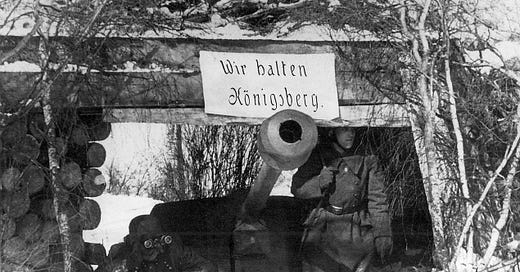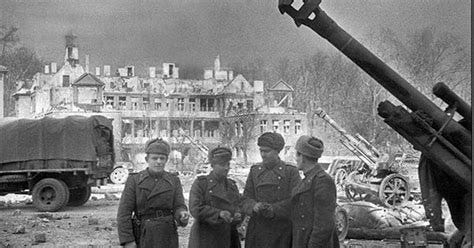Königsberg to Kaliningrad
A Short Break from Politics, with a Short Fantasy Story. Inspired by Neil Gaiman's, American Gods.
The city was cold, despite the smoldering craters. Bombing raids, from air and artillery, had flattened most of the buildings. All the spirit of the city could do is look up at a crumbling wall and inspect the graffiti. It was inscribed by the Soviets, who’d just marched by, and he heard many of them laughing as they passed. It was not laughter out of amusement, but of sweet-served revenge. More disturbing, were the flames of justice behind their eyes. The sheer joy the Soviets felt as they torched the castles, showered the forts with bullets, and chased civilians (mainly women) down once pristine boulevards. As the spirit of Konigsberg, he could only stand there and weep, as his people were punished and forced out of his arms.
Last year had been particularly difficult, when the British bombs fell during the summer, and the stench of everything dying or decaying never left the air. But this was different. The old knight, a proud Prussian, dressed in now tattered uniform, could feel the change. Konigsberg was named ‘the King’s hill’, and the old knight could feel it in his heart, this place would never be Konigsberg again. Its people had left him, whether by force or fear. The castles and forts, which stood for hundreds of years, were stripped bare, a now prized conquest of history.
He looked again at the crumbling, graffiti-covered wall. They were an interesting enigma, the Soviets. They were poor, yet proud. Fiercely stubborn, yet subservient to authority. Now, the graffiti confronted him with something more baffling. The Russians turned the question around on not just the spirit of Konigsberg, but all of Germany. The graffiti read;
Look at you. You have beautiful houses, wealthy farms, canned food, electricity. Why did you come to our country? And ruin it.
It had been many decades since the old knight had spoken to his Russian neighbors, or any of his non-German neighbors for that matter. He had seen St. Petersburg change. He was once beautiful and elegant, even fluent in German and French. But St. Petersburg had mutated into a rough, harsh, alcoholic, calloused, and unpleasant spirit. Though he was still sophisticated in his better moments, especially regarding music and theater, after the war and his mental breakdown in 1918, he was never the same. He even changed his name to Leningrad.
And Konigsberg had watched him with glee, as his neighbor was starved of life, bombarded, and blockaded. He had been there to see it. Leningrad’s only lifeline was a convoy of trucks crashing through icy lakes, feeding the starving people who remained inside. But the old bastard lived on and the Germans had failed to finish him off. Now, the old knight could see the revenge of Leningrad, infused with the spirit of righteous St. Peter, in the eye of every Soviet invader.
It was done. The old knight could no longer hold back the change, just as St. Petersburg could not. But Konigsberg’s transformation was more violent. And even more radical.
He continued to weep at the crumbling, marked wall before him. His wispy, aristocratic brown mustache fell from his face. A scraggily beard of dark brown, nearly black, itched at his throat. His once wavy, tamed hair grew flat and lost its sheen. His nose became small and mousy, making it hard to breathe through. And his eyebrows turned bushy and thick.
He stopped weeping and opened his eyes anew. He blinked several times and began to wonder why he had ever been crying at all. The spirit eyed his surroundings with a curiosity and disgust he was unfamiliar with. Then, a soldier noticed his presence. The soldier looked at him with questioning eyes, probably saying to himself ‘what is this old man doing here?’. He was young, pale faced, and strong jawed with a chip on his shoulder. Probably a captain who had advanced to his rank quite rapidly. “Old man! Who are you? And what are you doing here?” the Captain asked him. He was confident enough to keep his hands on his machine-gun but keep his fingers relaxed and off the trigger.
Again, the old spirit blinked at him, searching his mind for an answer. And then it came to him suddenly, as if it’d been obvious from the start.
“My name is Kaliningrad, comrade.” He said in an accent similar to the soldier’s. “And this is my city.”
The Soviet Captain looked pleased, a small smile coming across his lips, as a company of men under his command came up from behind to see the strange, curious person in front of them. The young soldier saluted him with an affectionate call of comrade and moved on. All the men in the company followed their captain’s example, without knowing so, saluting the spirit of the city with warm expressions of comrade, one after another.
The old man smiled on happily and nodded, looking every one of the boys in the eye with fatherly affection. These are my people, the spirit of the city thought. He borrowed a bottle of vodka from an especially generous lad, and took a swing of it, walking off into the sunset of decrepit buildings. The bombing raids had stopped and the city became peacefully silent.





